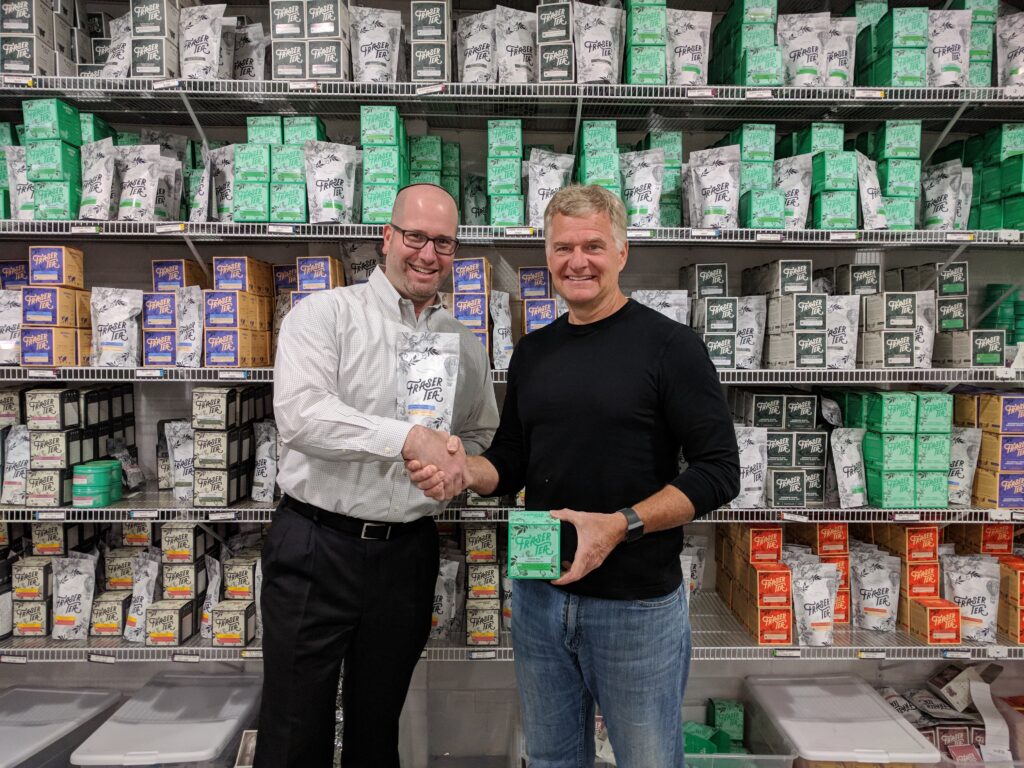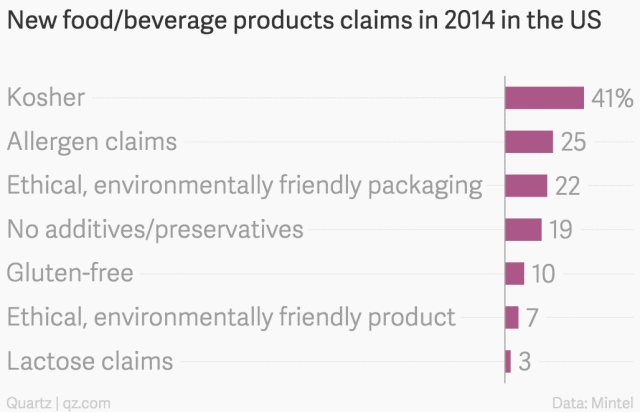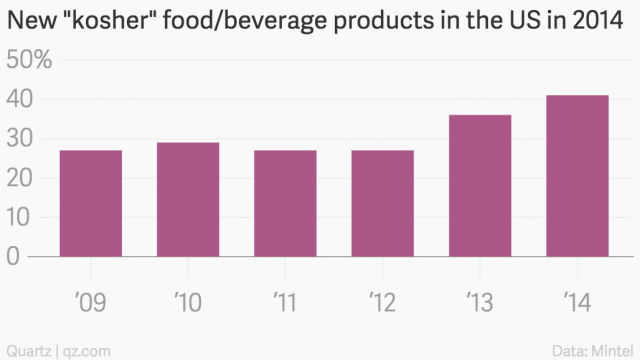Interview by Jonathan Katz, Flavors of the Diaspora Blog
Rabbi Jason Miller is the founder and director of Kosher Michigan, the world’s largest non-Orthodox kosher agency. He received his semichah (ordination) from the Jewish Theological Seminary in New York. He and his colleagues supervise the kashrut of food, kitchen products, and ingredients that are produced not only in Michigan and elsewhere in the Midwest, but across North America and even now in India. A number of years ago, he authored a popular article about the Orthodox domination of the kosher system and the “keeping up with the [frum] Joneses” culture around kashrut that it encourages. “Ending Kosher Nostra” is one of the best Jewish food articles I have read, and I strongly urge you to read it.
One of Rabbi Miller’s former students, Dr. Samuel Zerin, put me in touch with Rabbi Miller when I was soliciting stories for my pieces on institutional cooking. Rabbi Miller was very gracious with his time and allowed me to interview him by phone one recent evening. The transcript of the interview, slightly redacted for readability, is here.
A note to readers: there is a lot more Hebrew and Yiddish in this than in past pieces. Though normally I translate words into English, I kept the words here in my notes to preserve the integrity of the interview. I have provided or linked to definitions for all terms.
Katz: Tell us a bit about your background, and how Kosher Michigan got started.
Miller: I was ordained as a Conservative rabbi in 2004 from the Jewish Theological Seminary in New York. While I was in rabbinical school, I served as a mashgiach in the cafeteria. In the course of rabbinical school, you have classes on hilchot kashrut [laws of keeping kosher], but you don’t learn how to be a mashgiach unless you’re a mashgiach in the cafeteria. At the time, Rabbi Joel Roth was in charge of the hashgacha [kosher certification], and he would lead seminars only for the mashgichim. So that’s where I learned to be a mashgiach.
In 2007, I was hired by one of the largest Jewish camps in the country, Tamarack Camps in Michigan. For many decades, it was under the [kosher] supervision of the Detroit Orthodox va’ad [rabbinical council], which was well known. Around that time, the camp made the decision to no longer be under the supervision of the va’ad, and that a Conservative rabbi would be hired year-round to be the mashgiach for the kitchen, which is the largest kosher kitchen in Michigan. So I was hired, and 50% of my job was to oversee the kitchen. I learned how to handle the hashgacha for a year-round institution – there are camps, events, and programs all year, not just during the summer.
This made news in Michigan, that the va’ad was out and a Conservative rabbi was in. For many people, it was the first time that they heard that a Conservative rabbi could be a mashgiach. The va’ad made a public statement that was in support of Tamarack’s decision, and that they felt I would uphold the standards of kashrut and support them. Besides, the va’ad did not want to continue sending Orthodox mashgichim to this liberal progressive camp.
Many local businesses read this news, and contacted me, saying “we are a bakery, or a bagel store, we want to be kosher, but we met with the va’ad and they said no, or it was too expensive. We read that you did this for Tamarack, can you do it for us?” Initially, I said no, because I didn’t want to get into supervision politics. But people in the community pressured me, because they felt it would be great for the community. So in Summer 2008, I agreed to give certification for a bagel store and a bakery. I kept the price low, and I did not want to do a shakedown. At the last minute, someone asked “what is your hechsher [kosher seal]?” So I got on the computer and made one with a K and an M. It felt too self-serving to make the M “Miller,” so I said it was “Michigan.” And that’s how Kosher Michigan was born.
Katz: Here in New York, the Orthodox va’adot [councils] are very particular about who they support regarding kashrut, and invariably it is other Orthodox rabbis. I find it really interesting, in a good way, that they support you.
Miller: Well the va’ad has not been 100% supportive, because in the past decade we’ve now become a major competitor. But at the time they were supportive because they didn’t want to deal with the camp. It was difficult to find Orthodox mashgichim to go to this progressive Jewish camp, with all this gender mixing, girls in swimwear at the beach – and Camp Tamarack is 45 minutes from Metro Detroit, which has the closest synagogues.
Katz: I have friends who grew up in Orthodox Jewish areas of Southfield, so I’m a bit familiar with gender politics.
Miller: Yes. It was not a comfortable situation for them. So they were not interested in doing more. I would say they knew that a Conservative rabbi would uphold the standards they were used to. That was the promise I made to them and the community, and one I still keep now.
Katz: But that’s still really interesting that it was possible. As you know, in New York, we have a lot of people who have a “frummer (more religious) than thou” attitude to kashrut, where certain hechsherim (kosher seals) are and are not okay, and Conservative kashrut is not “good enough.” I’m personally of the opinion that it’s nonsense – kosher is kosher, despite the politics.
Miller: My own attitude has been similar to yours. I tell people that “I sleep very well at night” when I consider my approach to kashrut. When someone is “frummer than thou,” so frum that they won’t buy a Kosher Michigan-certified bagel, how does it affect me? Why does that person feel the need to say that? The person is most likely not doing that to other rabbis, just as I wouldn’t go to the owners of an Italian restaurant and tell them that I don’t buy Italian food. My response is dignified and respectful: “Thanks for letting me know.”
This, I think, gets to the heart of kishke Judaism. [Emotional Judaism] Why do you have that neurosis that you have to let me know that? I have written about this [in Kosher Nostra]. The same person will go into a non-kosher pizza shop and get a cheese pizza baked in the same oven as the pepperoni pizza, which is a lot more problematic for kashrut. It makes no sense.
Katz: There’s a performance to it.
Miller: People feel the need to say “I need you to know how frum I am.” A funny story from Tamarack: this Reform Jewish woman came up to me and said: “so now you’re in charge. Well congrats, but you should know my daughter is ba’alat teshuva [roughly, “born-again” Orthodox] so she won’t eat at the camp. She’s really frum, and she will only eat glatt pizza.” I responded, “well the cheese on our pizza is smooth!” After all, glatt refers the smoothness of the lungs on a cow – and thus only to the category of red meat.
But I don’t think it’s about people being ignorant, it’s something deeper – a spiritual, psychological meshugaas [nuttiness] that some people have.
Katz: It reminds me of the histrionics you see with adaptations in the liturgy and the crowing about matbe’ah shel tefillah [integrity of the prayer]- for example, people who get upset about adding the imahot/Matriarchs in the Shemoneh Esrei.
Miller: It’s this idea that “if it’s not the Judaism of my grandfathers, it doesn’t feel authentic.”
In ten years, I’ve seen and learned a lot because of my certification agency. And something that I’ve learned to do is to brush off the verbal attacks. The question “can a Conservative rabbi give a hechsher” is on the face of it a silly question. There’s no such thing as a Conservative hechsher, or an Orthodox one. There’s a trustworthy one.
It’s interesting. If someone is giving the certification, well, who is this person? Are they valid? Can they be trusted? Ask yourself these questions, but don’t ask where they went to school! It makes no sense when it comes to ne’emanut [trustworthiness].
Katz: I want to switch gears here to talk about being a mashgiach – what does your typical day look like?
Miller: So the agency has grown to the point now where I’m not actually the main mashgiach anymore – I have hired staff certifying all over the country, paid mashgichim. On a typical day, I’ll stop into several places, and I’ll be on the phone with the mashgichim elsewhere who supervise for my agency. It’s gone from mashgiach to a business of mashgichim.
I also answer a lot of phone calls and emails from business owners who want to become kosher. Sometimes it’s a long-standing business, like a jelly manufacturer seeking to expand outside of Michigan, and the food consultant tells them that becoming kosher will help them market the product better. And then there are the food product startups – the little old lady in Northern Michigan who make fudge and sells it out of her home, and people at church tell her to make it kosher, and she contacts me. And I tell her to go to a production facility – there are wholesale companies, co-packers, doing private label and producing and selling this kind of thing, and the shared facilities are much easier to make kosher.
Katz: I work for a New York City government agency writing information on basic safety and licensing regulations. (This is the non-accessibility part of my job.) A lot of the businesses we work with are food producers, and we’re trying to push them to shared kitchens. It’s very hard to have a home kitchen to the standard New York State requires for food manufacturers. Is it a big thing in Michigan? And how does that affect being a mashgiach?
Miller: Yeah, that’s interesting. In Michigan, back in 2008-2009 when the economy was in really bad shape, Governor Jennifer Granholm made a strong effort to spur more business. She made it much easier for folks to produce food out of home kitchens, but a home kitchen is impossible for me to certify as kosher because then I would need access to their home. So I got them to go to shared kitchens and in relationships with co-packers. There are so many people here in Michigan though doing that sort of thing.
Katz: I imagine, given that you’re in Michigan, that there’s a lot of Michigan-specific things, like jam, candy, and fish.
Miller: Well in Michigan we have some specific challenges – grape jam has its issues, and strawberry jam of course brings up all sorts of questions with inspections. But we’re the cherry capital so a lot of our specific stuff is cherries. More of our business is outside of Michigan though! We have an office in Chicago and a partner in London doing certifications in India –
Katz: India? How did that happen?
Miller: So we spread to India over the past three years, with food manufacturers and lots of different products like spice. It’s not sexy but it’s necessary.
It’s interesting. When Kosher Michigan began, we started off very basic with an Indian vegetarian restaurant, a kosher caterer, bakeries, et cetera. Then as the agency grew, we started certifying other things: meat dinners at Michigan State University at the residence halls, paper mills, chemical producers, so we’ve been moving more and more into that less sexy part of kashrut. There’s a whole industry of kosher certification for chemicals, vitamins, wax paper, and parchment paper – India is part of that.
Katz: It’s more of an exploration of food systems.
Miller: It’s the nitty-gritty of kashrut! No one at JTS taught me that or how to certify, say, a tractor-trailer. When we talk about kelim [food vessels], we don’t usually think of a tractor-trailer, but rather pots, pans, and so on. But if the beans are being hauled in a tractor-trailer that hasn’t been washed, that had pork in it, then that affects it.
Katz: A different sort of kelim.
Miller: Yes. The first time I got a call from a guy who wanted to certify a truck, I thought it was a prank call. But then I got on my computer and did some research. I didn’t realize that washing out a big tanker, so on, turns out to be a big part of the kosher industry. Same with two paper mills in Port Huron, Michigan, when dealing with paper and paraffin wax. So as a rabbi, I’m now wearing protective goggles, earplugs, and a hairnet to check the kashrut of paper in industrial mills – I never thought rabbinical school would lead here.
Katz: this whole thing of food systems and industrial food is interesting to contrast with the standard conversation on ever-frummer kashrut – the strawberries, the lettuce, and so on.
Miller: Yes, it’s interesting. A comment I get often from people is that Conservative rabbis probably wouldn’t be punctilious enough to require lettuce to be washed three times. That’s their way of saying that they’re so frum they go to the extremes to ensure there’s no bugs in their lettuce. What they don’t consider is that no one wants to be eating little, disgusting bugs in their lettuce, broccoli, strawberries, Brussels sprouts, and so on. That’s not only not kosher, but it’s gross.
Many thanks to Rabbi Jason Miller for his generosity of time and story-telling. Tizku le-mitzvot!








